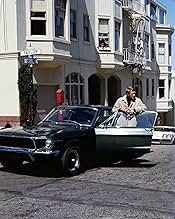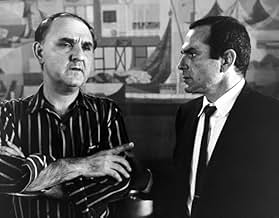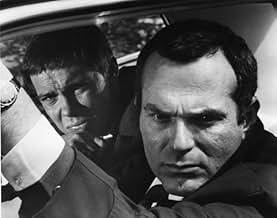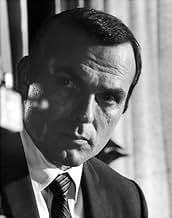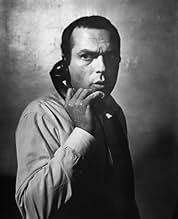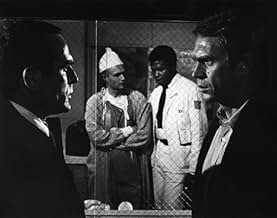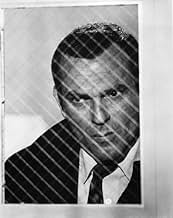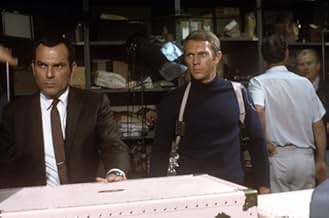एक ऑल-हिम्मत, नो-ग्लोरी सैन फ्रांसिस्को पुलिस अंडरवर्ल्ड सरगना को खोजने के लिए दृढ़ संकल्पित हो जाती है जिसने गवाह को अपनी सुरक्षा में मार डाला।एक ऑल-हिम्मत, नो-ग्लोरी सैन फ्रांसिस्को पुलिस अंडरवर्ल्ड सरगना को खोजने के लिए दृढ़ संकल्पित हो जाती है जिसने गवाह को अपनी सुरक्षा में मार डाला।एक ऑल-हिम्मत, नो-ग्लोरी सैन फ्रांसिस्को पुलिस अंडरवर्ल्ड सरगना को खोजने के लिए दृढ़ संकल्पित हो जाती है जिसने गवाह को अपनी सुरक्षा में मार डाला।
- निर्देशक
- लेखक
- स्टार
- 1 ऑस्कर जीते
- 7 जीत और कुल 9 नामांकन
Vic Tayback
- Pete Ross
- (as Victor Tayback)
फ़ीचर्ड समीक्षाएं
Despite having aged somewhat, Bullitt remains a tough, gritty, and altogether realistic portrait of police life in late sixties San Francisco. The film is of course most renowned for the spectacular (even by today's standards) car chase in which star Steve McQueen famously did his own stunt driving (I wonder what the insurance policy was like?!) Although McQueen didn't really have to stretch beyond his already established screen persona, he is perfect in the role. He is Bullitt like Connery is Bond. Maybe the role was tailored specifically for him. He also has Jacqueline Bisset (Cathy), who can more than hold her own with any Bond girl, to come home to! She adds a welcome domestic quality and the audience feels relieved that despite the unforgiving profession Bullitt works in, at least he has a good woman at his side. The location photography in beautiful San Francisco, the to-the-letter accurate procedural dialogue, the political infighting with the smarmy D.A. Chalmers (Robert Vaughn) and the brutally violent action scenes all complement the fine performances to create an entirely engrossing authentic crime drama. Watch for the great Robert Duvall in a minor role as the cabbie.
A great example of the sordid, violent, 60's detective film, and a prime influence on every t.v. detective series from the 1970's onward. Grittily realistic with San Francisco making an excellent back drop for one of Steve McQueen's best roles. As detective Frank Bullit, assigned to guard a chief witness in a senate investigation, McQueen is a perfect combination of stoicism and jaded cool. Robert Vaughn makes an excellent corrupt politician attempting to gain publicity with a mob investigation, and Jacquline Bisset is beautiful as McQueen's girlfriend and voice of normalcy. The stylish medium shot direction of Peter Yates ( his best film) makes for a fast past action /suspense/ police thriller. And of course there's the justifiably famous car chase.
Probably the most beautiful car chase in all of Hollywood cinema. That alone is worth the price of admission to the theater. Apart from that, I came to this movie after the chapter Quentin Tarantino dedicated to it in his recent book. Deservedly so, I would say. The forerunner of tough and pure cops, Bullitt has charisma and charm to spare, thanks in large part to Steve McQueen. The role fits him perfectly. The soundtrack is also one of the most iconic around, Lalo Schifrin knew what he was doing. Thank you Quentin for introducing me to this old film, which I include among the classics of the genre.
The late 1960s saw two classic, hard-boiled thrillers set in San Fransico; John Boorman's stylised 'Point Blank', and Peter Yates' 'Bullitt'. Calling your hero Bullitt might seem an unsubtle way to emphasise his macho qualities, but in fact Steve MacQueen plays him as a quiet man, not some wise-talking maverick: he does what he has to do, but takes no pleasure in his actions; and survives the roughness of his work not by becoming a monster, but simply by becoming a little less human. It's a believable portrait, and the film as a whole has a procedural feel: there are action scenes, but these are kept in their place in the overall design.
Today, the film is most famous for its celebrated car chase, which makes excellent use, as indeed does the movie as a whole, of the bay area locations, but is not actually shot that excitingly: the conclusion at the airport is more original, though it roots the film in the time when it was permissible to take a loaded gun onto a plane. But overall this is still a classy film, dry, exciting and bleak, and among the very best films of its day. William Friedkin's brilliant 'The French Connection', made a short while afterwards, would appear to owe it a debt.
Today, the film is most famous for its celebrated car chase, which makes excellent use, as indeed does the movie as a whole, of the bay area locations, but is not actually shot that excitingly: the conclusion at the airport is more original, though it roots the film in the time when it was permissible to take a loaded gun onto a plane. But overall this is still a classy film, dry, exciting and bleak, and among the very best films of its day. William Friedkin's brilliant 'The French Connection', made a short while afterwards, would appear to owe it a debt.
The first lone-wolf cop story plays by the rules of the genre it spawned, featuring a charismatic, outsider type who carries a badge and an attitude directed just as much against the egos and hubris of his superiors as against the criminal element.
Frank Bullitt (Steve McQueen) is a detective lieutenant on the San Francisco police force who gets handed a "babysitting job" looking after a would-be Mob informant by ambitious politico Chalmers (Robert Vaughn). Things go wrong with an attempted hit that leaves the informant and his guard in intensive care and Bullitt on the wrong side of Chalmers, not to mention a pair of killer hoods who tool around in a Dodge Charger and have no respect either for stop signs or Mustangs.
"Bullitt" the movie is best-known for an automotive duel between the assassin duo and Bullitt, still championed by some as the greatest car chase in movie history. I think it's been lapped myself, though I admire the long sections of real-time churn-and-burn since it flies in the face of MTV-style fast cutting we know today. The hoods Bullitt chase look like insurance salesmen, but of course they were really stunt men, and with McQueen doing a good deal of his own stunt driving as well, there's a validity to the sequence that makes up for some slackness in the composition.
"Bullitt" is a better film for the things that occur around the car chase, not so much with the central mystery of Johnny Ross as with the scenes of Bullitt in his element, like making coffee, talking with his superiors, eating a sandwich. McQueen's acting was showcased better in films like "The Sand Pebbles," "The Cincinnati Kid," and even his final film "The Hunter," but his star power was never more in evidence than it was here, especially in the scenes he shares with Vaughn, who plays the role of a preppy hardass to perfection and gives both McQueen and the viewer a foil more evil than the real crooks in this picture.
Seeing Bullitt handle Chalmers' baiting is a real lesson in how less is more. There's a scene where a fingerprint check gives Bullitt the opportunity to let Chalmers have it, but instead of rounding on the jerk, he simply tells Chalmers the score as he makes for the door in one of the great underplayed lines ever filmed.
Verisimilitude is everything in "Bullitt," as director Peter Yates and screenwriters Alan Trustman and Harry Kleiner present it. Long scenes are shot in operating rooms, morgues, and hotel-room crime scenes as a way of presenting what we are seeing as real in a way no other film did then and few have done since. Every shot, as Yates explains on his DVD commentary, was shot on a real location, and you feel like he got it all down exactly right, getting the right mix of style and drab reality. A shot cop moans while blood pulses through his wound, while a strangled woman is seen in such gory detail we understand another character's need to throw up over it. Throughout there's Bullitt as only McQueen could play him, saying the right line the right way, jumping in an ambulance to fix a problem, telling his gorgeous girlfriend (Jacqueline Bisset) "It's not for you, baby" in a way that comes off utterly cool rather than gratingly sexist.
I couldn't figure out what was going on with the crooks "the Organization" as they are dubbed since calling them the Mafia was seen as demeaning to a particular ethnic group not yet known for creating films like "The Godfather" or "GoodFellas" not until I watched "Bullitt" a second time, at which point I realized that wasn't so important. "Bullitt" has an annoying subtext of police work as dehumanizing, something Bullitt understands implicitly makes him a tool for the wrong sort of people. That was the year that was 1968, Chicago and all that, but the au currant anti-establishment notes do rankle.
But McQueen was a cinematic great, one who doesn't get as much attention today but proves here why his image is so enduring. Yates credits the clothes McQueen wears, but Yates himself, along with his writers, Vaughn, Bissett, and a terrific supporting cast led by Simon Oakland as Bullitt's tough-but-fair captain, create one of the great platforms for a movie tough guy ever built, a platform McQueen fills very, very well.
Frank Bullitt (Steve McQueen) is a detective lieutenant on the San Francisco police force who gets handed a "babysitting job" looking after a would-be Mob informant by ambitious politico Chalmers (Robert Vaughn). Things go wrong with an attempted hit that leaves the informant and his guard in intensive care and Bullitt on the wrong side of Chalmers, not to mention a pair of killer hoods who tool around in a Dodge Charger and have no respect either for stop signs or Mustangs.
"Bullitt" the movie is best-known for an automotive duel between the assassin duo and Bullitt, still championed by some as the greatest car chase in movie history. I think it's been lapped myself, though I admire the long sections of real-time churn-and-burn since it flies in the face of MTV-style fast cutting we know today. The hoods Bullitt chase look like insurance salesmen, but of course they were really stunt men, and with McQueen doing a good deal of his own stunt driving as well, there's a validity to the sequence that makes up for some slackness in the composition.
"Bullitt" is a better film for the things that occur around the car chase, not so much with the central mystery of Johnny Ross as with the scenes of Bullitt in his element, like making coffee, talking with his superiors, eating a sandwich. McQueen's acting was showcased better in films like "The Sand Pebbles," "The Cincinnati Kid," and even his final film "The Hunter," but his star power was never more in evidence than it was here, especially in the scenes he shares with Vaughn, who plays the role of a preppy hardass to perfection and gives both McQueen and the viewer a foil more evil than the real crooks in this picture.
Seeing Bullitt handle Chalmers' baiting is a real lesson in how less is more. There's a scene where a fingerprint check gives Bullitt the opportunity to let Chalmers have it, but instead of rounding on the jerk, he simply tells Chalmers the score as he makes for the door in one of the great underplayed lines ever filmed.
Verisimilitude is everything in "Bullitt," as director Peter Yates and screenwriters Alan Trustman and Harry Kleiner present it. Long scenes are shot in operating rooms, morgues, and hotel-room crime scenes as a way of presenting what we are seeing as real in a way no other film did then and few have done since. Every shot, as Yates explains on his DVD commentary, was shot on a real location, and you feel like he got it all down exactly right, getting the right mix of style and drab reality. A shot cop moans while blood pulses through his wound, while a strangled woman is seen in such gory detail we understand another character's need to throw up over it. Throughout there's Bullitt as only McQueen could play him, saying the right line the right way, jumping in an ambulance to fix a problem, telling his gorgeous girlfriend (Jacqueline Bisset) "It's not for you, baby" in a way that comes off utterly cool rather than gratingly sexist.
I couldn't figure out what was going on with the crooks "the Organization" as they are dubbed since calling them the Mafia was seen as demeaning to a particular ethnic group not yet known for creating films like "The Godfather" or "GoodFellas" not until I watched "Bullitt" a second time, at which point I realized that wasn't so important. "Bullitt" has an annoying subtext of police work as dehumanizing, something Bullitt understands implicitly makes him a tool for the wrong sort of people. That was the year that was 1968, Chicago and all that, but the au currant anti-establishment notes do rankle.
But McQueen was a cinematic great, one who doesn't get as much attention today but proves here why his image is so enduring. Yates credits the clothes McQueen wears, but Yates himself, along with his writers, Vaughn, Bissett, and a terrific supporting cast led by Simon Oakland as Bullitt's tough-but-fair captain, create one of the great platforms for a movie tough guy ever built, a platform McQueen fills very, very well.
क्या आपको पता है
- ट्रिवियाWhile filming the scene where the giant airliner taxis just above Steve McQueen, observers were shocked that no double was used. Asked if the producers couldn't have found a dummy, McQueen wryly replied, "They did."
- गूफ़During the chase sequence, the same green Volkswagen Beetle is seen at least 4 different times in 4 different locations in a period of not more than 1 minute.
- इसके अलावा अन्य वर्जनDuring the car chase, when the Charger goes wide on a corner and hits a camera, the film was salvaged and red frames added at the end, to give a "point of impact" impression. Despite this gag being in situ for decades, on the current Cinemax Asia print, someone has seen fit to completely remove these last frames of the shot.
- कनेक्शनEdited into City on Fire (1979)
टॉप पसंद
रेटिंग देने के लिए साइन-इन करें और वैयक्तिकृत सुझावों के लिए वॉचलिस्ट करें
- How long is Bullitt?Alexa द्वारा संचालित
- Who played the doorman at the Mark Hopkins in "Bulllitt" and gave the hitmen info about the cab, "Sunshine Cab 6912?"
- Why did Johnny Ross (Renick) go to the Mark Hopkins at the beginning of "Bullitt" to pick up a letter?
- Who notified the two killers which hotel Renick/Ross was being held?
विवरण
- रिलीज़ की तारीख़
- कंट्री ऑफ़ ओरिजिन
- भाषा
- इस रूप में भी जाना जाता है
- Bullitt
- फ़िल्माने की जगहें
- Coffee Cantata, Union Street, सैन फ़्रांसिस्को, कैलिफोर्निया, संयुक्त राज्य अमेरिका(jazz club and restaurant scene)
- उत्पादन कंपनी
- IMDbPro पर और कंपनी क्रेडिट देखें
बॉक्स ऑफ़िस
- बजट
- $55,00,000(अनुमानित)
- US और कनाडा में सकल
- $5,11,350
- US और कनाडा में पहले सप्ताह में कुल कमाई
- $4,08,627
- 7 अक्टू॰ 2018
- दुनिया भर में सकल
- $5,12,162
इस पेज में योगदान दें
किसी बदलाव का सुझाव दें या अनुपलब्ध कॉन्टेंट जोड़ें





